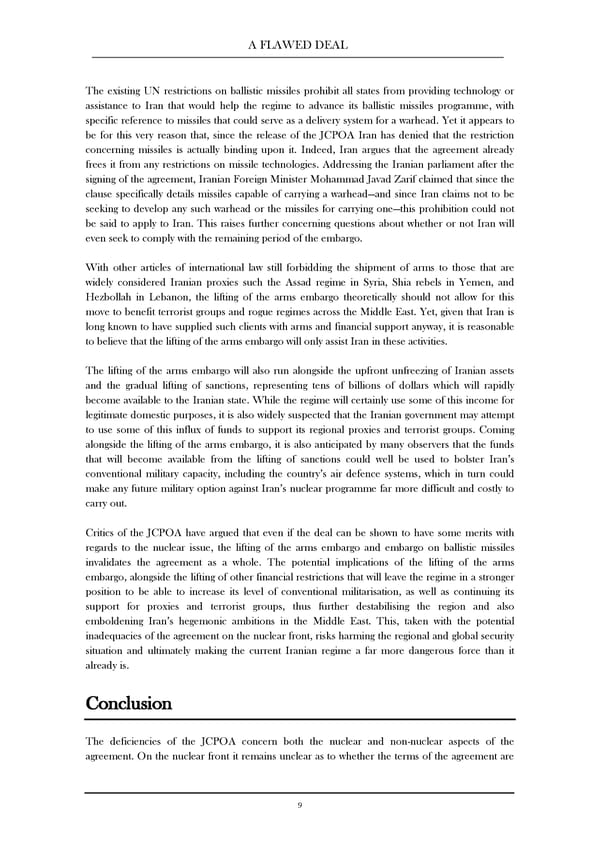! A FLAWED DEAL The existing UN restrictions on ballistic missiles prohibit all states from providing technology or assistance to Iran that would help the regime to advance its ballistic missiles programme, with specific reference to missiles that could serve as a delivery system for a warhead. Yet it appears to be for this very reason that, since the release of the JCPOA Iran has denied that the restriction concerning missiles is actually binding upon it. Indeed, Iran argues that the agreement already frees it from any restrictions on missile technologies. Addressing the Iranian parliament after the signing of the agreement, Iranian Foreign Minister Mohammad Javad Zarif claimed that since the clause specifically details missiles capable of carrying a warhead—and since Iran claims not to be seeking to develop any such warhead or the missiles for carrying one—this prohibition could not be said to apply to Iran. This raises further concerning questions about whether or not Iran will even seek to comply with the remaining period of the embargo. With other articles of international law still forbidding the shipment of arms to those that are widely considered Iranian proxies such the Assad regime in Syria, Shia rebels in Yemen, and Hezbollah in Lebanon, the lifting of the arms embargo theoretically should not allow for this move to benefit terrorist groups and rogue regimes across the Middle East. Yet, given that Iran is long known to have supplied such clients with arms and financial support anyway, it is reasonable to believe that the lifting of the arms embargo will only assist Iran in these activities. The lifting of the arms embargo will also run alongside the upfront unfreezing of Iranian assets and the gradual lifting of sanctions, representing tens of billions of dollars which will rapidly become available to the Iranian state. While the regime will certainly use some of this income for legitimate domestic purposes, it is also widely suspected that the Iranian government may attempt to use some of this influx of funds to support its regional proxies and terrorist groups. Coming alongside the lifting of the arms embargo, it is also anticipated by many observers that the funds that will become available from the lifting of sanctions could well be used to bolster Iran’s conventional military capacity, including the country’s air defence systems, which in turn could make any future military option against Iran’s nuclear programme far more difficult and costly to carry out. Critics of the JCPOA have argued that even if the deal can be shown to have some merits with regards to the nuclear issue, the lifting of the arms embargo and embargo on ballistic missiles invalidates the agreement as a whole. The potential implications of the lifting of the arms embargo, alongside the lifting of other financial restrictions that will leave the regime in a stronger position to be able to increase its level of conventional militarisation, as well as continuing its support for proxies and terrorist groups, thus further destabilising the region and also emboldening Iran’s hegemonic ambitions in the Middle East. This, taken with the potential inadequacies of the agreement on the nuclear front, risks harming the regional and global security situation and ultimately making the current Iranian regime a far more dangerous force than it already is. Conclusion The deficiencies of the JCPOA concern both the nuclear and non-nuclear aspects of the agreement. On the nuclear front it remains unclear as to whether the terms of the agreement are 9 ! !
 A Flawed Deal Page 11 Page 13
A Flawed Deal Page 11 Page 13